The following piece is a work of fiction (because Tiger Lily is a fictional character originally portrayed in J.M. Barrie's children's stories about "Peter Pan", followed by numerous stage and movie adaptations. Perhaps her most famous portrayal is in Disney's cartoon version of Peter Pan, where she is represented as a young, nubile, beautiful Native American princess who flirts with Peter Pan and refuses to help Captain Hook even though he is threatening to sink her to the bottom of the ocean (violence against Native women and children is HILARIOUS). She also does not speak, not once, in the entire film. In Which I Interview Tiger Lily, famous Indian Princess... or Tiger Lily might just be my sister from another mister, that's cool. 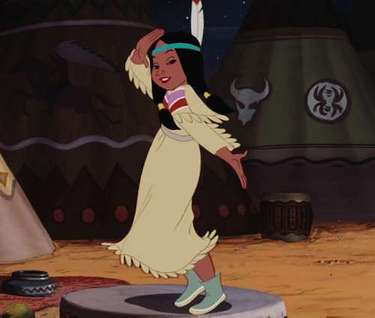 Perhaps she is best known as the beautiful Native girl with a whole lot of attitude. She was the queen of the side-eye, and while never an "official" Disney Princess, for many years she was the only representation of a Native female in a Disney feature film. And I hated her. Her attitude. Her dancing. Her jealously and competitiveness with Wendy. Her snobbiness. She seemed like the only person in the entire Peter Pan adventure who was just actively snotty. (Later, I would recognize that Tinker Belle was also a pretty snotty female character, but I forgave her because she was very tiny and people often grabbed her and spanked her without her permission in an attempt to get Pixie Dust. Gross.) I first met Tiger Lily in a dream. She looked a lot like I would imagine her to look "in real life." She had dark hair, it was long, she was wearing a beautiful buckskin dress, fully beaded moccasins and her hair was perfectly silky and shiny even though we were sitting outside in the wind. I asked her what she was doing there and she said "looking for you" and then she asked me if I would like a cup of hot chocolate and I woke up. The next time we met was at a coffee shop for tea (because neither of us likes coffee). I couldn't believe that she was there with me because I was supposed to be writing my dissertation. She looked different too. Her hair was graying and cut into a shorter, smoother shoulder length bob. And she was wearing a white tshirt, blue jeans, converse and a very cute beaded belt. She sat across from me and said "You look like you've seen a ghost." And I said "or an imaginary figure that shouldn't exist in real life but is sitting with me right now." She asked me "Do you know how stories come to people?" And that is how she began... "Do you know how stories come to people? Because I've always been told that stories come at inconvenient times or convenient times. They come in person or in dreams. They are everywhere around you. They exist outside of your self. They find you. Many native people would say that stories and prayers and songs are never lost, because even when there is nobody singing them, or saying them, or telling them, or knowing them... they still exist and they will come to somebody... someday. Each person might tell the story a little bit differently..." She asked me if I had ever heard her stories? And I said "the only story I ever knew of Tiger Lily existed in Disney's cartoon version of Peter Pan made in 1953 and based off of JM Berrie's children's stories about Peter Pan (published in 1902) and subsequent play (1904), which admittedly I'd never read before although I'd heard that the portrayal of Native people left something to be desired. She smiled and said "JM Berrie was a man who wanted to believe that Native people could exist somewhere in his imagination and could help his young boy who did not want to grow up to finally find a home away from home." That, she said, is what she found the most compelling about the way white male authors told the stories of Native peoples. "They had lost so much in the loss of their own Indigenous-ness." She said. "They had lost their home, their center. Native people were concerned with balance, not with power. With prayers, not with contracts and the bottom line. The bottom line was we all deserved to grow old in a good way." I whole heartedely agreed with her but still couldn't find much to say because it was freaking Tiger Lily sitting before me. She took a deep breath and agreed to do an interview with me, right there on that day in the coffee shop when I was supposed to be writing my dissertation. "Do you have a question?" And the only thing could think to say was the first thing that came to my head "Yeah, so, I sort of hated you growing up." 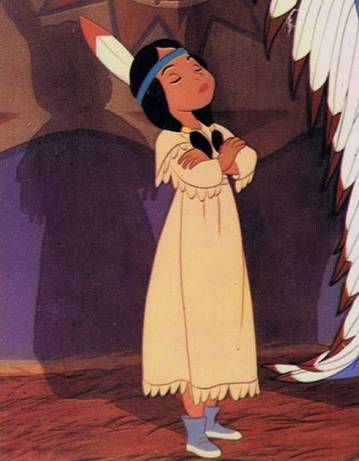 Me: I need to be honest here, because I hope that honesty extends to your speaking with me today. I really hated you growing up. Tiger Lily: Thank you? Me: It was just that, at the time (and I may be dating myself here) you were really the only Native Disney Princess that was around. This was before Pochahontas, so I had one example of a Native girl in the movies in my childhood and she was you. And it always seemed like you thought you were better than me. Tiger Lily: I probably was... better than you. Me: A better Indian anyway. You looked like an Indian, you danced like one. You were what kids expected to see and so they would look at me and just be disappointed. Sometimes they would pull my braids. Sometimes they would call me Squaw. Tiger Lily: Those kids sound like little jerks. Me: But again, you were all they knew. They thought it was funny. Tiger Lily: So...little jerks. Me: You know they just announced casting for a new film that is sort of based on Peter Pan. It's supposed to be about his origin story. Tiger Lily: I heard. Me: Rooney Mara is supposed to play you. Or a version of you. According to the press release it's not like she's a Native American she's more like a "multi-racial/international" person or in an "multi-racial/international" movie? I'm not quite sure. TL: What does that mean? Me: Well, I think it means that they anticipate there being some backlash because she is a non-Native actress playing a famous Native character. So they want to put out the fire by saying she's not really going to be a Native person. TL: So in an effort to avoid the criticism, they will just erase my Native-ness as if that is not a significant part of who I am? Me: Yes. TL: That's flattering and not degrading to me at all. Me: I feel like we should note to readers that you are being sarcastic. You are being sarcastic, right? TL: I am. For the record. Me: Have you heard about the new film? TL: Not until the casting news came out. Me: Do you have any comments or reactions to the casting news? TL: Not on any emotional level. Hollywood likes their Indians in a certain package. When I met Walt Disney, I don't think he even saw me for what I really looked like, I think I instantly became a certain kind of Indian girl to him. My hair, my eyes, my body, it was all, in his imagination, designed to evoke the right socio-emotional response to seeing a "Red Man." 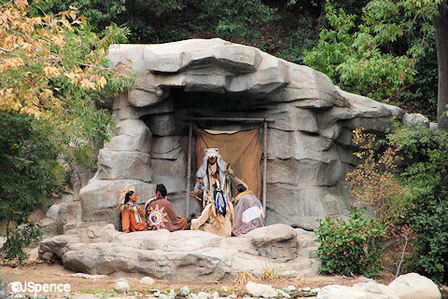 Me: So you met Walt Disney? TL: I spent some time with him, yes. The thing about Mr. Disney, he was somewhat fascinated with Native peoples. This was a man who lived through his imagination. But Mr. Disney was like a lot of people, he was raised on certain books and pictures and in those books and pictures Native people were a primitive civilization that died out long ago. Me: Disney has a weird history with Native peoples if you think about it. TL: Do you know that at one time the Jungle Cruise, a place where you can see hippos and tigers and lions, used to also feature a Native American village? Did you know that he would bring Native people in to the park to do dance demonstrations? Frontier land was built on this cowboys and Indians legend. You could buy a Tomahawk and some feathers or a cowboy hat and some guns and head to Tom Sawyer's Fort and pretend to kill each other. Me: So this new version of Peter Pan, which they are just calling "Pan" by the way... TL: It's just more of the same, but what makes it worse -- it doesn't have to be. They need to put the work in to tell a better story. Do you know how many Native writers and directors and actors there are out there? A lot more than you think. I don't trust "Hollywood" with this story, not yet. Me: You trusted them before? TL: Trust is a weird word. I think I had in mind the best intentions for telling a story. Me: Can we talk about this moment then? TL: I had a feeling it would come up, yes. Me: I think this is probably one of the most memorably bad moments in Disney history. I think most people would point to this as a major problem. TL: It is a major problem. Especially because of the way that it was portrayed. In this situation, we, as Native people became racist caricatures. But this is not the real story. Me: What is the real story? TL:Native people are pretty funny. At least that's the experience I've had. And you know what I remember about this story? Pan brings this group of little white children, from England, and they don't know much about Native people. So my Dad, he doesn't take this whole thing seriously. Another day, another group of white kids coming to make a fool of themselves in front of Natives. And the kids start asking these questions because nobody has ever taught them anything useful about Natives. Their questions are like "Why does he askem how?" and "What makes the Red Man red?" What kinds of questions are those? Me: Offensive ones. TL: But not just offensive. They are violent questions. They violently question my intelligence. They are questions meant to put me down and in my place. That tells you a lot about how these kids view Native people. Here is this five year old kid wearing pajamas and he thinks it is okay to ask when Native peoples first said "ugh?" He should have been ashamed but he was awash in his privilege. So my Dad says "well the first time I saw my Mother-In-Law I was all UGH." Ha ha, right? Me: Humor is lost on the young. TL: Or ignored. Or blatantly disregarded. If a Native person is sarcastic or funny or intelligent in their humor, people need to ignore it because those kinds of things make you sentient, they make you living. It's the same reason why people ignore the humor and love and personality that comes from animals, or trees, or the waters. Again, the portrayal of this song reflects so much on the kind of acceptable racism surrounding Native peoples and their image. I was disappointed, yes, in the portrayal of this story. But I was also infuriated. It took me a long time to tell more stories. It took me a long time to come and sit with you today. This wasn't just a "funny" or "racist" portrayal of Native people, this was violent and deliberate. We have to keep asking why Non-Native people want Native people to be so stupid or silent? Why? Because the lasting effects of genocide they don't just infest and wreak havoc on Native peoples for generations, they infest, mark, change and affect Non-Native persons. It is written as much in their history as in ours, even if they try to ignore or "Disney" it away. Me: And the way you were portrayed in this song? Pan is asked to take you as his bride? And you essentially do a table dance for him after he was just made in to an Indian and given a new name. You nuzzled him on the nose and turn his face bright red. TL: Nope. I could go on for days about the sexualization of Native women in Hollywood films, novels and stories. There is a reason why Native women are treated like objects. My voice was literally stripped away from me in this film. They did not want to hear me speak. THIS is how Disney storytellers adapt and portray my story, that says a whole lot about them. 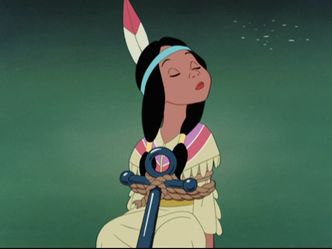 Me: I get that. I thought about it a lot as I was trying to reconcile my distaste for your portrayal in this film, and who you are, or could have been for me as I was growing up. Like when I look at this moment from this picture. You're tied up to an anchor and Captain Hook is going to sink you. TL: You know what I am in this moment... annoyed. Me: But you know what else I see in this moment, conviction. I started watching the film over again a few months ago and I started to think about the strength and courage you show throughout the movie. It took me many years to see through all the B.S. of this Peter Pan portrayal and instead try and listen to your story, and then wanting to re-claim your story. I don't think you belong to Mr. Barrie, or Mr. Disney. That was always hard for me to understand. Some people would say Mr. Barrie is your inventor, you came from his imagination. TL: Those people would be wrong. And even if he was the first person to describe me and write me down, that doesn't mean that I only get one story and one voice. That doesn't mean that we can't tell the story better now. How would people tell my story if they knew more? If they took a Native American Studies class? If they read more about Native women and colonization? If they talked to Native writers and directors and artists? That's what I would tell the writers and director of this new film. Why not try to actually learn something and make a good movie? Not a slightly less racist movie or a more international/multi-racial Pan-Indian white savior movie, but a good movie. They hold so tightly to their racist, sexist, ignorant portrayal of Native peoples. That is Hollywood. That is appropriation. That is seeing Natives in old photos, but not in new TV Shows. This is comfortable to them. So we are used as props to some story about adventure and fantasy. We are used as sidekicks to white people's stories about themselves. And if they like, we become invisible to them. One time I was at the coffee shop and I heard this kid saying that he had never met a real Native American before. I smiled and said "Now you have, hello." And he just stared blankly at me. He sort of shook his head and said "No, not like a Native person out here in the real world, but you know, like a real Native American, like the real kind." I sort of went with it, I smiled and said to him "Well, if one of the real Native Americans came in here, what would you say? What would you want to ask them?" And the kid just shrugged and went "I'd probably just ask to take a picture and Instagram it." Because you know what they say, if it's not on Instagram... it didn't happen. 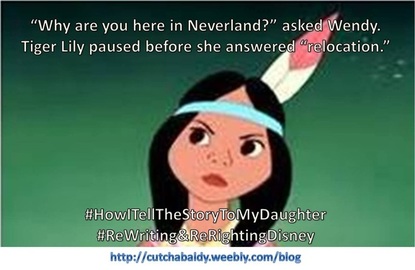 She was at the end of her cup of tea when she stopped and smiled at me. "Did you get what you needed?" she asked and I just nodded. She stood up to put her tea cup in the plastic bin and she offered to take mine as well. I handed it to her with shaky hands. "By the way," she said "if you ever find the time and want to write a really good movie about me you should talk about how we ended up in Neverland in the first place." "How was that?" I asked. She laughed and replied -- "Relocation" before she headed for the door. #IndianHumor
1 Comment
Chummy
3/17/2014 02:43:53 pm
Isn't one of the songs about hunting or fighting Indians?
Reply
Your comment will be posted after it is approved.
Leave a Reply. |
SubscribeClick to
AuthorCutcha Risling Baldy is an Associate Professor and Department Chair of Native American Studies at Humboldt State University. She received her PhD in Native American Studies from the University of California, Davis. She is also a writer, mother, volunteer Executive Director for the Native Women's Collective and is currently re-watching My Name is Earl... (5) Top PostsOn telling Native people to just "get over it" or why I teach about the Walking Dead in my Native Studies classes... *Spoiler Alert!*
Hokay -- In which I lead a presentation on what happens when you Google "Native American Women" and critically analyze the images or "Hupas be like dang where'd you get that dentalium cape girl? Showing off all your money! PS: Suck it Victorias Secret"
In which we establish that there was a genocide against Native Americans, yes there was, it was genocide, yes or this is why I teach Native Studies part 3 million
5 Reasons I Wear "Indian" Jewelry or Hupas...we been bling-blingin' since Year 1
Pope Francis decides to make Father Junipero Serra a saint or In Which I Tell Pope Francis he needs to take a Native Studies class like stat
I need to read more Native blogs!A few that I read...
Archives
June 2020
Categories
All
|

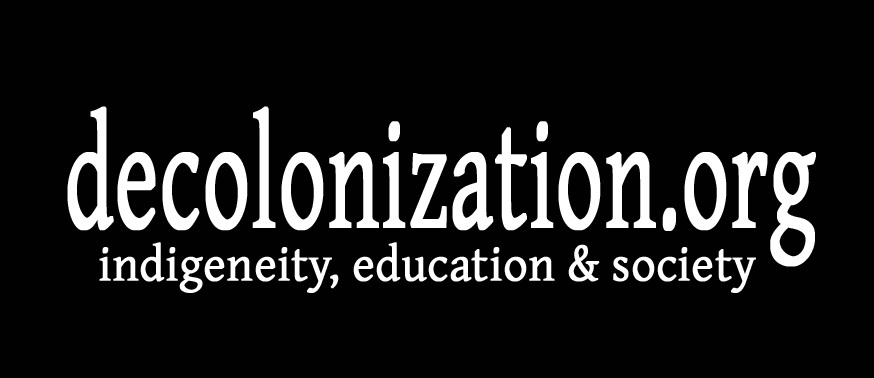


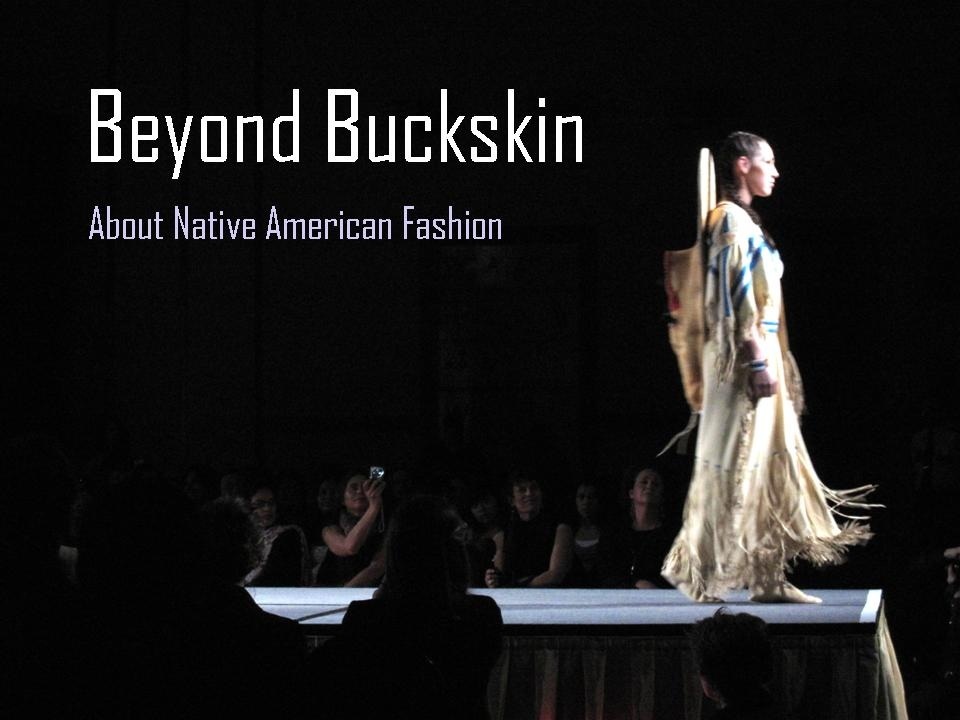

 RSS Feed
RSS Feed
